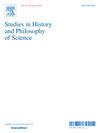衡量需要妥协:经济不平等的例子
IF 1.8
2区 哲学
Q1 HISTORY & PHILOSOPHY OF SCIENCE
引用次数: 0
摘要
我们研究了进入社会科学措施设计和评估的考虑因素,将它们分为四个驱动因素:认识论、伦理、实用主义和计量学。我们称他们为“驱动者”,以强调他们在指导研究人员决策而非决定研究人员决策方面的作用。通过对《2022年世界不平等报告》的分析,我们揭示了这些驱动因素之间的紧张关系,说明了一项措施必须满足的各种需求之间复杂的相互作用。我们的分析强调,为了解决这些紧张关系,需要逐个妥协,因为优化一个驱动程序往往是以牺牲另一个驱动程序为代价的。我们探索这些妥协形状测量实践的程度和原则,指导研究人员在平衡他们。虽然现有的测量文献假设张力可以通过良好的实践和使用来解决,但我们认为,开发一个良好的测量需要平衡多种需求,认识到同时满足所有需求可能是不可能的。本文章由计算机程序翻译,如有差异,请以英文原文为准。
Measurement requires compromises: the case of economic inequality
We examine considerations that enter into design and evaluation of measures in social science, categorizing them into four drivers: epistemic, ethical, pragmatic, and metrological. We call them drivers to highlight their role in guiding researchers’ decisions without determining them. Through an analysis of the World Inequality Report 2022, we reveal tensions among these drivers, illustrating the complex interplay between the various demands a measure must satisfy. Our analysis highlights the need for case-by-case compromises to address these tensions, as optimizing one driver often comes at the expense of another. We explore the extent to which these compromises shape measurement practice and the principles that guide researchers in balancing them. While existing literature on measurement assumes that tensions can be resolved with good practice and use, we argue that developing a good measure requires balancing multiple demands, recognising that it might be impossible to meet all of them simultaneously.
求助全文
通过发布文献求助,成功后即可免费获取论文全文。
去求助
来源期刊

Studies in History and Philosophy of Science
管理科学-科学史与科学哲学
CiteScore
2.50
自引率
10.00%
发文量
166
审稿时长
6.6 weeks
期刊介绍:
Studies in History and Philosophy of Science is devoted to the integrated study of the history, philosophy and sociology of the sciences. The editors encourage contributions both in the long-established areas of the history of the sciences and the philosophy of the sciences and in the topical areas of historiography of the sciences, the sciences in relation to gender, culture and society and the sciences in relation to arts. The Journal is international in scope and content and publishes papers from a wide range of countries and cultural traditions.
 求助内容:
求助内容: 应助结果提醒方式:
应助结果提醒方式:


